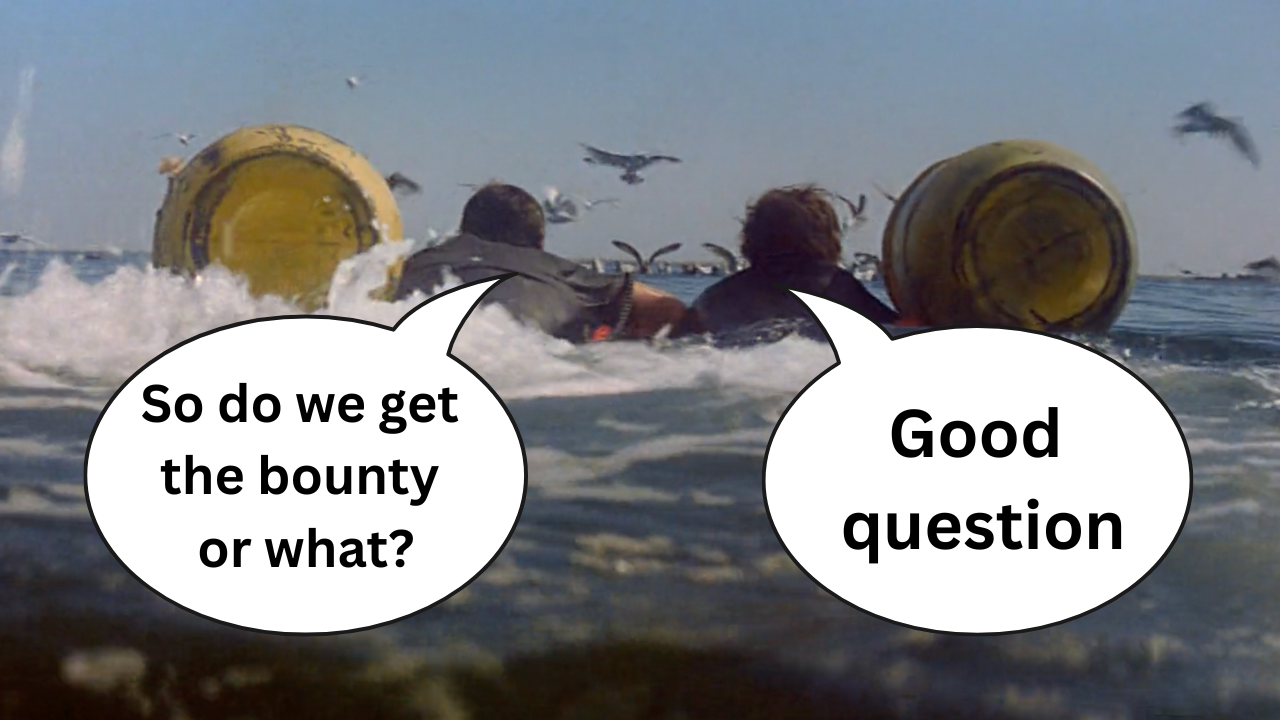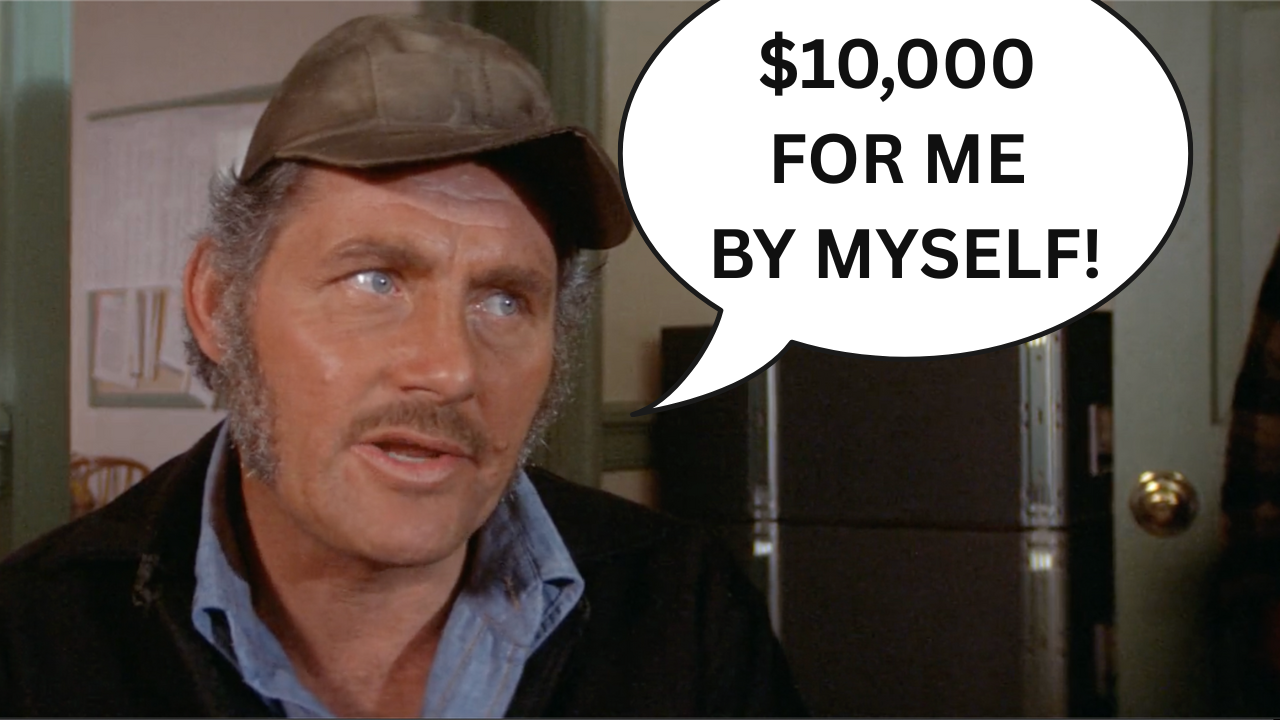What happened to the $10,000 bounty in JAWS?
When Steven Spielberg’s JAWS hit theaters in 1975, it did more than just redefine the modern blockbuster — it set the gold standard for cinematic suspense and adventure. But while audiences were captivated by the bloodthirsty shark and the doomed trio of Brody, Hooper, and Quint, there’s a small detail that has intrigued attentive viewers for decades: what happened to the $10,000 bounty offered for the shark?
In the film, after young Alex Kintner is killed by the shark, his grieving mother offers a $3,000 reward for the killer fish. This amount is quickly raised to $10,000 by the townspeople and local officials — a significant sum in 1975 (roughly $60,000 today, adjusted for inflation). The bounty becomes a pivotal plot point, igniting a frenzied shark-hunting spree that brings chaos to Amity Island. But after that? It simply... disappears from the story.
Here are a few theories as to what may have happened to that elusive prize:
1. Quint Was Never in It for the Money
Captain Quint, the grizzled fisherman with a haunting past and a vendetta against sharks, famously demands $10,000 to catch and kill the beast. The town ultimately agrees, though it’s never made explicitly clear who foots the bill — the mayor, the town council, or perhaps a combination of local contributors. However, it’s possible Quint never expected to collect. His motivation is steeped in trauma and pride, not greed. If he died in pursuit of the shark (as he ultimately does), the reward may have simply become moot — unpaid and unclaimed.
2. Hooper and Brody Were Never Officially Hired
Hooper joins the hunt out of scientific interest, and Brody, the police chief, embarks on the voyage more out of duty than for financial gain. Neither man appears to have a financial motive, and neither mentions collecting the bounty once the shark is dead. After the ordeal, with Quint gone and the boat destroyed, the two survivors may have seen the money as secondary to survival.
3. The Town Quietly Shelved the Reward
By the end of the film, Amity Island is bruised but saved. The menace is gone, but the town's image has been tarnished. It's likely the mayor and town council wanted to move on — fast. If no one formally claimed the reward, they may have quietly rescinded it, hoping no one would ask questions. It’s even possible the money never existed in the first place beyond a verbal agreement, or was only ever partially pledged.
4. Alex Kintner’s Mother Refused to Pay It
In an alternate but plausible theory, Mrs. Kintner may have withdrawn her offer, either for financial reasons or emotional ones. The trauma of losing her son could have made her reluctant to reengage with the incident, especially after learning the town had downplayed earlier shark attacks. Her offer was also personal, and it’s never confirmed whether the increased amount was formally organized or just a community-driven rumor.
5. Mayor Vaughn Pocketed It for Political Survival
In one of the more cynical theories, Mayor Larry Vaughn — ever the image-conscious politician — may have quietly redirected the funds into his own reelection campaign. Given how hard he worked to keep the beaches open and downplay the shark threat to preserve Amity’s summer economy, it’s conceivable that he saw the bounty as a PR stunt more than a genuine expense. Once the ordeal was over, and with the town needing to rebuild both its finances and reputation, Vaughn may have opted to “reallocate” the funds, using them to shore up political goodwill or finance his next campaign, away from public scrutiny. After all, Vaughn’s survival in office depended less on who killed the shark and more on convincing voters he had everything under control.
6. The Money Sank with the Orca
One of the darker, more symbolic theories suggests that even if the money was set aside for the shark's killer, it went down with the Orca — Quint’s boat, which sinks in the final act. If the payment was ever made, and if Quint had it on board (unlikely, but not impossible), it may have died with him in the belly of the sea.
Conclusion: Spielberg Didn’t Care — and That Might Be the Point
In the end, the question of the bounty may be a cinematic red herring. Spielberg and screenwriter Carl Gottlieb likely understood that the real stakes were never monetary. JAWS is a story about fear, obsession, and survival — not about prize money. The disappearance of the bounty may reflect a deeper truth: in the face of true danger, human motivations shift. What begins as a cash-fueled frenzy becomes a life-and-death struggle, and by the time the shark is killed, no one is thinking about checks or contracts.
Still, the mystery remains a fascinating footnote in a film full of iconic moments. For fans and theorists alike, it’s another reason why JAWS continues to make waves — even fifty years later.
If you would like to write for The Daily Jaws, please visit our ‘work with us’ page
For all the latest Jaws, shark and shark movie news, follow The Daily Jaws on Instagram, Twitter and Facebook.


